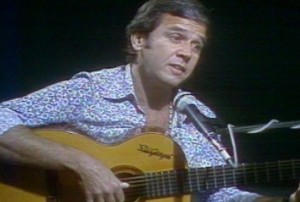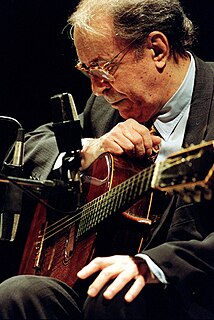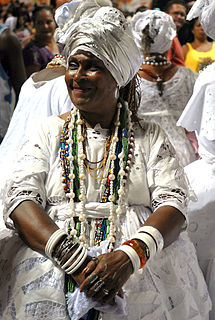
Caetano Emanuel Viana Teles Veloso is a Brazilian composer, singer, guitarist, writer, and political activist. Veloso first became known for his participation in the Brazilian musical movement Tropicalismo, which encompassed theatre, poetry and music in the 1960s, at the beginning of the Brazilian military dictatorship that took power in 1964. He has remained a constant creative influence and best-selling performing artist and composer ever since. Veloso has won nine Latin Grammy Awards and two Grammy Awards. On November 14, 2012, Veloso was honored as the Latin Recording Academy Person of the Year.

Gilberto Passos Gil Moreira, known professionally as Gilberto Gil, is a Brazilian singer-songwriter and politician, known for both his musical innovation and political activism. From 2003 to 2008, he served as Brazil's Minister of Culture in the administration of President Luiz Inácio Lula da Silva. Gil's musical style incorporates an eclectic range of influences, including rock, Brazilian genres including samba, African music, and reggae.
Bossa nova is a style of samba developed in the late 1950s and early 1960s in Rio de Janeiro, Brazil. It is mainly characterized by a "different beat" that altered the harmonies with the introduction of unconventional chords and an innovative syncopation of traditional samba from a single rhythmic division. The "bossa nova beat" is characteristic of a samba style and not of an autonomous genre.

Francisco Buarque de Hollanda, popularly known simply as Chico Buarque, is a Brazilian singer-songwriter, guitarist, composer, playwright, writer, and poet. He is best known for his music, which often includes social, economic, and cultural reflections on Brazil.

Carlos Eduardo Lyra Barbosa is a Brazilian singer and composer of numerous bossa nova and Música popular brasileira classics. He and Antonio Carlos Jobim, were the first two music composers, together with lyricists Vinicius de Moraes and Ronaldo Boscoli, to be recorded by João Gilberto on his first LP entitled Chega de Saudade (1959), which was called the first generation of Bossa Nova.

João Gilberto was a Brazilian singer, songwriter, and guitarist, who was a pioneer of the musical genre of bossa nova in the late 1950s. Around the world he was often called "father of bossa nova"; in his native Brazil, he was referred to as "O Mito".

Axé is a popular music genre originated in Salvador, Bahia, Brazil in the 1980s, fusing different Afro-Caribbean genres, such as marcha, reggae, and calypso. It also includes influences of Brazilian music such as frevo, forró and carixada. The word Axé comes from the Yoruba term àṣẹ, meaning “soul, light, spirit or good vibrations”. Axé is also present in the Candomblé religion, as “the imagined spiritual power and energy bestowed upon practitioners by the pantheon of orixás”.

Jorge Duílio Lima Menezes is a Brazilian popular musician, performing under the stage name Jorge Ben Jor since the 1980s, though commonly known by his former stage name Jorge Ben. His characteristic style fuses samba, funk, rock and bossa nova with lyrics that blend humor and satire with often esoteric subject matter. His hits include "Chove Chuva", "Mas Que Nada", "Ive Brussel" and "Balança Pema", and have been interpreted by artists such as Caetano Veloso, Sérgio Mendes, Miriam Makeba, Soulfly and Marisa Monte.

Getz/Gilberto is an album by American saxophonist Stan Getz and Brazilian guitarist João Gilberto, featuring pianist and composer Antônio Carlos Jobim, who also composed many of the tracks. It was released in March 1964 by Verve Records. The album features the vocals of Astrud Gilberto on two tracks, "Garota de Ipanema" and "Corcovado". The artwork was done by artist Olga Albizu. Getz/Gilberto is a jazz and bossa nova album and includes tracks such as "Desafinado", "Corcovado", and "Garota de Ipanema". The last received a Grammy Award for Record of the Year and started Astrud Gilberto's career. "Doralice" and "Para Machucar Meu Coração" strengthened Gilberto's and Jobim's respect for the tradition of pre-bossa nova samba.

Maria Bethânia Viana Teles Veloso is a Brazilian singer and songwriter. Born in Santo Amaro, Bahia, she started her career in Rio de Janeiro in 1964 with the show "Opinião" ("Opinion"). Due to its popularity, with performances all over the country, and the popularity of her 1965 single "Carcará", the artist became a star in Brazil.

Chiclete com Banana is an Axé music band, currently consisting of Bell Marques, Wadinho Marques, Rey, Waltinho Cruz, Deny and Lelo. The group is named after the very well known and influential song "Chiclete com Banana", written by Gordurinha and Almira Castilho, which was first recorded in 1959 by Brazilian popstar Jackson do Pandeiro and by dozens of performers, including Gilberto Gil.
"Aquarela do Brasil", written by Ary Barroso in 1939 and known in the English-speaking world simply as "Brazil", is one of the most famous Brazilian songs.

Preta Maria Gadelha Gil Moreira, known as Preta Gil, is a Brazilian singer and actress. She is the daughter of Gilberto Gil, a famous musician and former Minister of Culture in Brazil.

Erasmo Carlos is a Brazilian singer and songwriter, most closely associated with his friend and longtime collaborator Roberto Carlos. Together, he created many chart hits including "É Proibido Fumar", "Sentado à beira do caminho", "Além do Horizonte", "Amigo" and "Festa de Arromba".

Tania Maria is a Brazilian artist, singer, composer, bandleader and piano player, singing mostly in Portuguese or English. Her Brazilian-style music is mostly vocal, sometimes pop, often jazzy, and includes samba, bossa, Afro-Latin, pop and jazz fusion.

Astrud Gilberto is a Brazilian samba and bossa nova singer. She became popular in the 1960s after her performance of the song "The Girl from Ipanema ".
"Aquele Abraço" is a song in the samba genre by Brazilian singer-songwriter Gilberto Gil. Written during a period of military dictatorship and cultural censorship in Brazil, the lyrics invoke neighborhoods, landmarks, samba schools and popular culture figures of Rio de Janeiro. It was released as the third track, with an expanded version as track 11, on Gil's third album Gilberto Gil, issued by Universal in 1969. On the tracks, he introduces the song as being "for Dorival Caymmi, João Gilberto and Caetano Veloso," all major Brazilian singer-songwriters.

El Pequeño Mundo is the nineteenth studio album and the fourth in Spanish language album by Brazilian singer and TV host Xuxa Meneghel. It was released in October 1994 in Argentina by Polygram.

Expresso 2222 is the fifth studio album by Brazilian artist Gilberto Gil, released in June 1972 by Philips Records. In October 2007, the magazine Rolling Stone's Brazilian edition published a list of the 100 Greatest Albums of Brazilian Music, in which Expresso 2222 featured at number 26.

Quanta gente veio ver: Ao Vivo, known internationally as Quanta Live, is a Grammy-winning 1998 album by Brazilian musician Gilberto Gil recorded live with a seven-piece band at the Teatro João Caetano in Rio de Janeiro during his 1997 world tour. At the 41st Annual Grammy Awards, it won the award for Best World Album. The album's tracks span a number of musical styles, including tropicalia, a genre with which Gil is closely associated, as well as samba, funk, bossa nova, reggae, jazz, salsa, and pop.
















